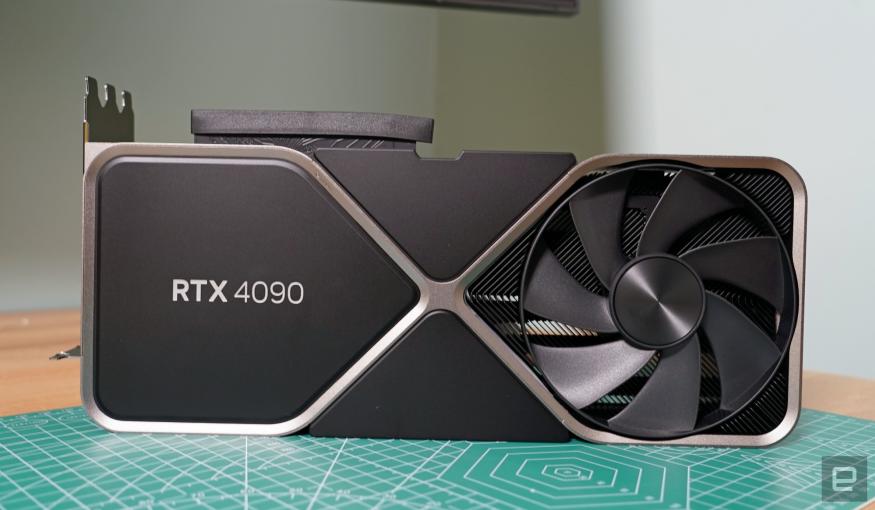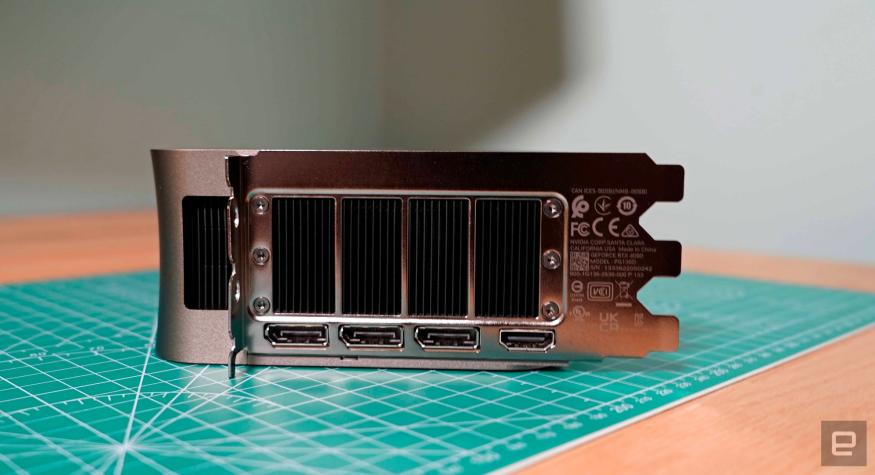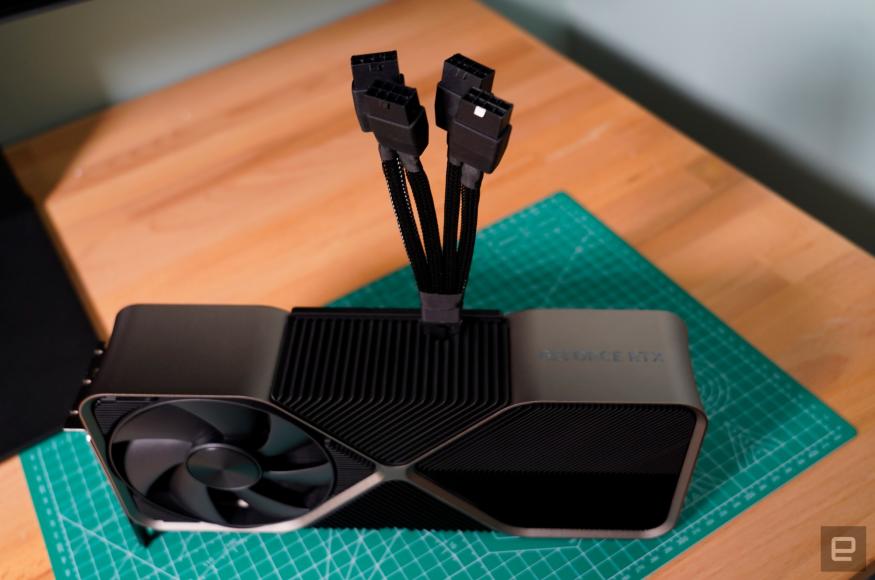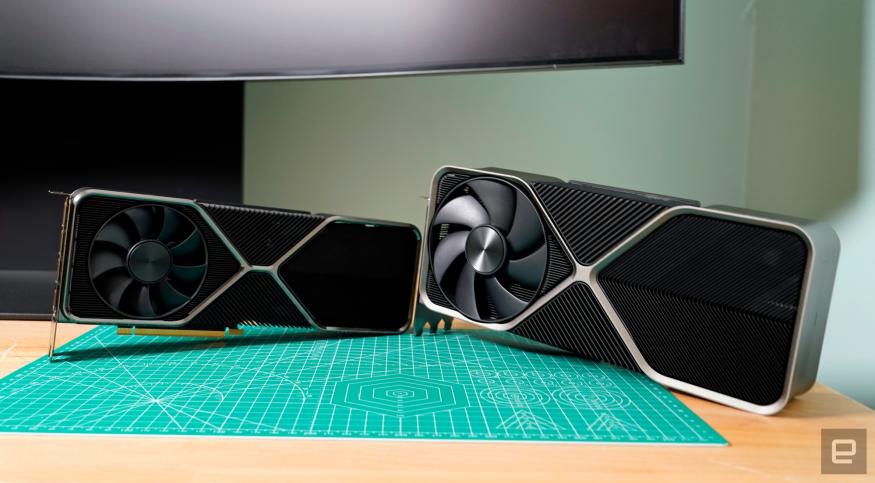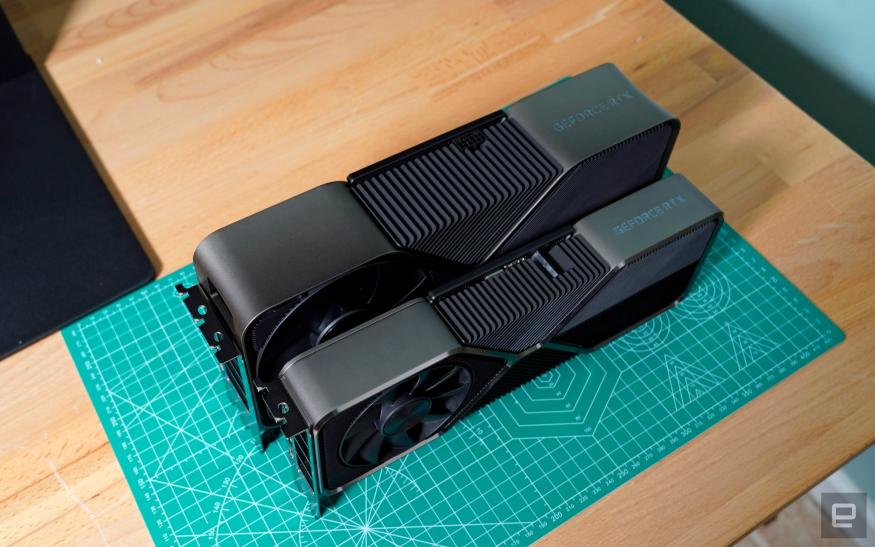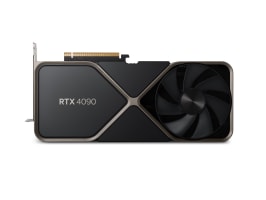
How do you go about reviewing something like NVIDIA’s RTX 4090? Just looking at its specs alone, it’s obviously the fastest consumer GPU we’ve ever seen. So sure, I can tell you that I can play just about anything in 4K with ray tracing and every graphical nicety turned on. Hell, it can even scale up to 8K if you’re a masochist. For a $1,599 video card, it damn well better. But the real question is, who is this thing actually for?
Gallery: NVIDIA RTX 4090 | 11 Photos
Gallery: NVIDIA RTX 4090 | 11 Photos
Benching the RTX 4090 against NVIDIA and AMD’s older hardware is practically pointless. Of course it’s far faster. Of course it’ll make you jealous. If you’ve got the cash and you’re itching to upgrade, go with God (or NVIDIA’s leather-clad CEO Jensen Huang, as the company’s fans see him). But for anyone else who doesn’t need bleeding edge hardware, it exists purely as an object of lust. Sure, you could wait for the upcoming RTX 4080 cards, or whatever AMD has in the works, but it’s not a 4090. Just like the last generation of GPUs, NVIDIA is throwing down the gauntlet with a power-hungry card for the most hardcore gamers and creators.
Pros
- Incredible performance
- Efficient cooling
- Viable 4K ray tracing
Cons
- Huge power demands
- Requires 4 cables on older PSUs
- Expensive
If your mind isn’t made up, I assume you’re here just to see how much of a beast the 4090 is. And let me tell you, it’s a stunning thing to behold. Weighing in at 4.8 pounds, and approaching the size of the PlayStation 5, the RTX 4090 is a triple-slot GPU that will dominate whatever case it’s in. Seriously, if you’re thinking of getting it, be sure to measure your PC to ensure you can fit a nearly foot-long card that’s close to 5 inches thick.
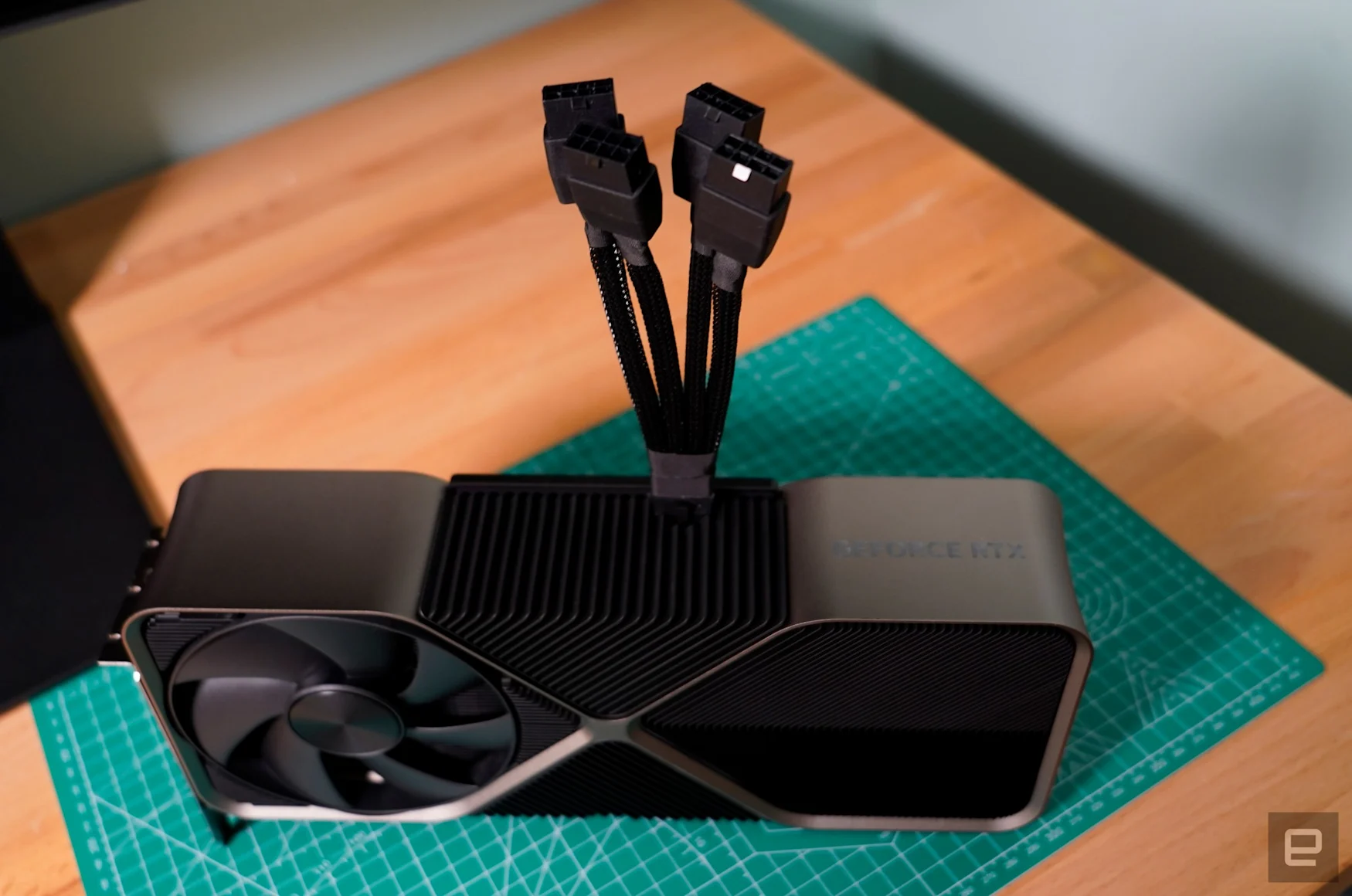
Be prepared to upgrade your power supply too: The 4090 has a high 450W TDP (the same thermal design profile as the 3090 Ti) and it requires an 850W PSU. (Some third-party companies are pushing that demand to 1200W PSUs!) While it can be powered by a single PCIe 5.0 cable, there still aren’t many of those PSUs on the market, so most people will likely end up using four 8-pin adapters. I cursed Jensen’s name when I realized I needed to string another PSU line, after tidying up all of my cables.
Beyond its obscene power demands, though, NVIDIA hasn’t changed much about the 4090 Founder Edition’s design from its previous model: It’s still a high-end, all-metal card with a massive vapor chamber, heatsink array and two fans on opposite sides. NVIDIA claims they can push 20 percent more air than the 3090 Ti – in my testing, that meant the 4090 stayed at a relatively cool 70C under load.
What’s truly special about the RTX 4090, though, is everything under the hood. It features the company’s new “Ada Lovelace” architecture (named after the world’s first computer programmer, though I wonder if NVIDIA pays any royalties to turn her name into marketing). It has 16,384 CUDA cores (almost 6,000 more than the 3090 Ti), a base clock speed of 2.23GHz (boost to 2.52GHz), and 24GB of GDDR6X RAM. With figures like these, the upcoming RTX 4080 cards (which start with 7,680 CUDA cores) seem puny in comparison.
And really, that seems like the point of dropping the 4090 before the rest of NVIDIA’s new GPUs. It’s like a heavenly body so massive it warps space time around it. This is the new standard. What other GPU can get you 135fps in Cyberpunk 2049 while playing in 4K with maxed out graphics and ray tracing?
To be clear, though, the 4090 isn’t just about brute-force power. It was able to reach that killer Cyberpunk framerate by using DLSS 3, NVIDIA’s latest AI upscaling technology that can now generate entire frames of imagery on its own. (That’s in addition to upscaling lower resolution textures using AI, like earlier versions.) DLSS 3 helped A Plague Tale Requiem perform more than twice as fast while running in 4K, delivering around 175fps (up from 74fps).
|
None |
3DMark TimeSpy Extreme |
Port Royal (Ray Tracing) |
Control |
Blender |
|
NVIDIA RTX 4090 |
16,464 |
25,405/117.62 fps |
4K (Native) High RT: 107 fps |
12,335 |
|
NVIDIA RTX 3080 Ti |
8,683 |
12,948/59.95fps |
4K (Native) 43fps Med RT |
5,940 |
|
AMD Radeon RX 6800 XT |
7,713 |
9,104/42.15fps |
4K (Native) No RT 28-40 |
N/A |
The RTX 4090 had no trouble delivering 107 fps in Control while playing in 4K with high ray tracing settings. But you know what’s even better? Getting a solid 128 fps when I flipped on an older version of DLSS. It’s just unfortunate it doesn’t support DLSS 3 yet, because I’m sure it would eke out even better performance. Even though the game was actually being rendered in 1,440p, to my eye, DLSS still does a stunning job of making that seem like 4K. (I tested the 4090 alongside Samsung’s 55-inch Arc monitor, giving me a much larger view than my typical 34-inch ultrawide screen. If there were graphical anomalies, I would have seen them.)
I was particularly interested in stressing ray tracing performance on the 4090, because that was a feature that still managed to bring NVIDIA’s 30-series cards to their knees. It enables more realistic lighting, shadows and reflections. For most, I’d wager the graphical facelift it delivers would be more impressive than a skyrocketing framerate count. So it’s a wonder to see an NVIDIA card that can finally deliver 4K and solid ray tracing beyond 100fps. Is that worth $1,599, though? That remains unclear, especially since we don’t know how the rest of the 40-series cards will compete.
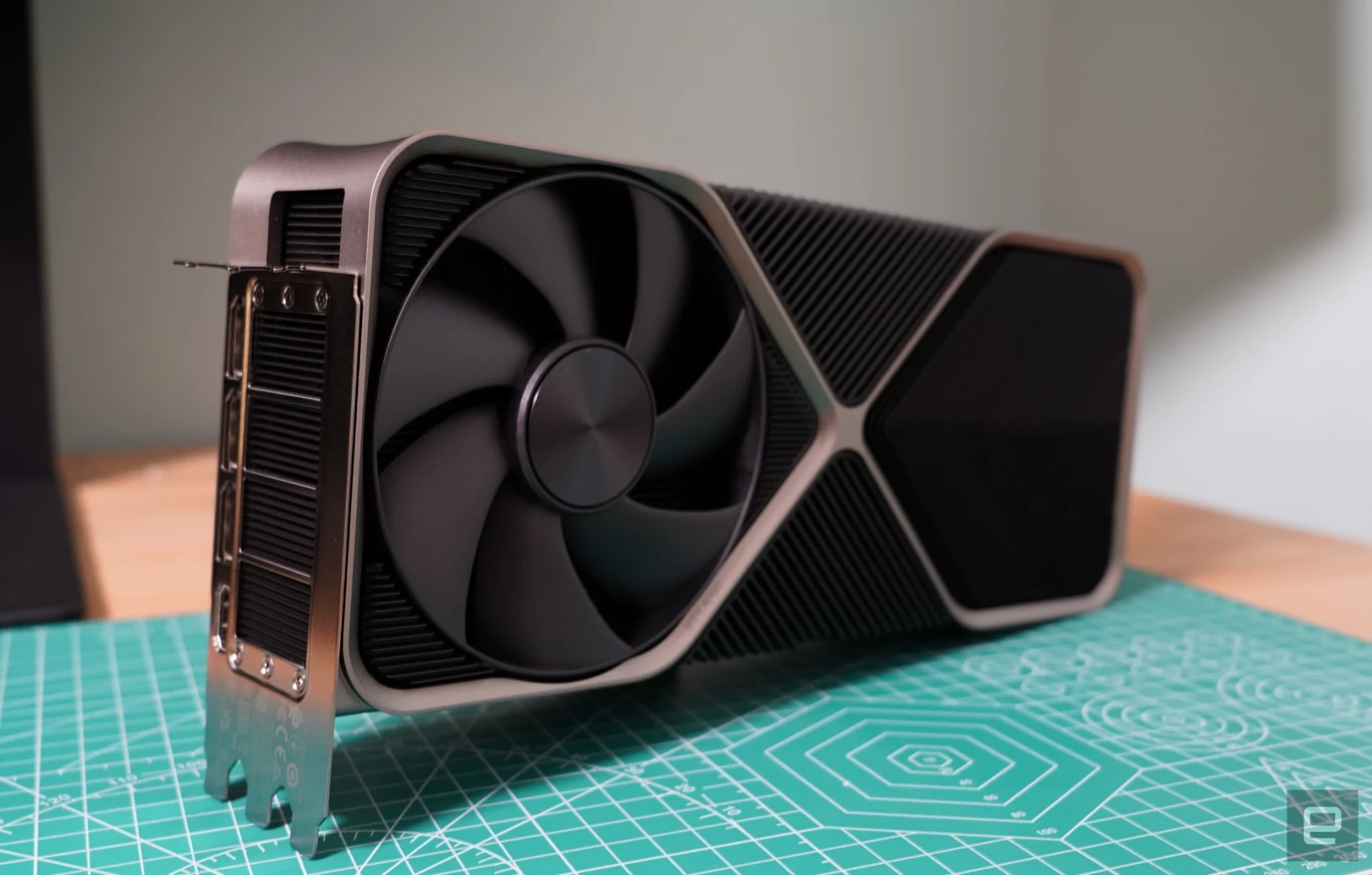
If you’re looking for a video card that can do more than just game, the 4090 may make more sense. In the Blender 3D rendering benchmark, it scored twice as high as the RTX 3090 Ti, a GPU released earlier this year for an eye-watering $1,999. (Let’s have a moment of silence for the poor souls who jumped on that card.) When it came to transcoding a short 4K clip into 1080p, the RTX 4090 was also 10 seconds faster than the 3080 Ti. That could certainly add up if you’re rendering longer clips, episodes or feature films.
It’s hard not to covet the RTX 4090, especially once you see what it’s capable of. It’s a glimpse into a world where we can finally get uncompromised ray tracing. But with the $899 and $1,199 RTX 4080 cards on the horizon, it’s tough to drop the price of an entire computer just to get the best frame rates in town There’s just so much more to consider these days. You could pair up one of those 4080s with a Steam Deck, for example, and bring the joys of PC gaming on the road and all over your home. Sure, you won’t have the prestige of being in the 4090 club, but you’ll probably end up having more fun.
Author: 88
Source: Engadget



